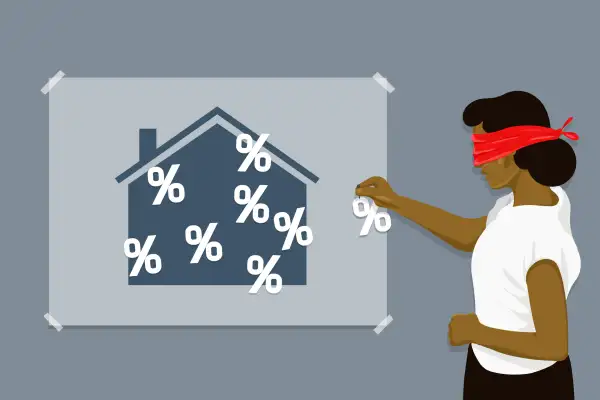Black Homeowners Are Being Left out of the Mortgage Refinance Boom

While the homeownership gap between Black and white families is well-known, the disparities in refinancing are less talked about.
Record low mortgage rates have spurred a massive home buying and refinancing boom. More than 8 million homeowners refinanced their mortgages last year, according to data analytics provider Black Knight, saving thousands of dollars.
But not everyone is able to take advantage.
Between April 2020 and January 2021, less than a quarter of Black homeowners who could have saved $200 or more per month by refinancing completed the process or sold their homes. Meanwhile, almost 40% of white borrowers eligible for the same savings did so, according to mortgage-purchaser Freddie Mac.
Refinancing at low interest rates can be transformative for a homeowner's monthly budget and can create massive savings over the life of a loan. So, what’s holding back Black refinance numbers?
Black and Hispanic borrowers could benefit hugely from refinancing
From 2005 to 2015 Black and Latino borrowers paid mortgage interest rates of 0.4 percentage points more than white homeowners. A main reason for that was that they didn’t refinance as often — a seemingly small mistake that has long-term financial consequences.
Earlier this year, Freddie Mac also found that nearly 50% of Black and Hispanic 30-year-fixed-rate mortgage holders could still save at least $100 every month by refinancing. That’s compared to 38% of white households that could save that same amount.
Researchers have documented a gap between Black and white homeowners refinancing their mortgages for decades, and it’s more than a small loss of cash. If your loan balance is $300,000, reducing your interest rate to 3% from 3.4% would save more than $20,000 in interest payments over the life of a 30-year loan.
Why are Black homeowners less likely to refinance their mortgages?
Difficulty qualifying
Refinancing your mortgage is never an automatic process. Homeowners have to meet a set of requirements in order to qualify.
Lenders typically require credit scores of at least 620 to get a loan at all — and much higher to get the best rates. Black Americans tend to have lower credit scores than white Americans. There are structural reasons for the gap, such as Black borrowers often holding more student loan debt and having less access to credit cards. However, there are steps borrowers can take to improve their credit scores. For example, pull your credit report and dispute errors that may be dragging down your score.
People of color were also hit hard by job losses during the pandemic. Losing a job can disqualify you from getting a refinance, because it likely means no longer meeting the income requirements needed to secure the new loan.
Unfavorable reappraisals
Refinancing also typically requires the owner’s home to be re-appraised, a process that looks increasingly vulnerable to bias and discrimination.
In one recent example, a Black family who had just spent $400,000 renovating their California home, was stunned when an appraiser said their home value had increased by just $100,000. Suspicious, they requested the appraisal be redone, the family told local ABC affiliate KGO.
During the second appraisal they had a white friend act as the homeowner. The result? They received an estimate that was nearly $500,000 higher than the one they were given weeks earlier. If this couple were to do a cash-out refinance, the lower valuation would have limited how much they could borrow from their home equity.
David Kottman, the director of lending at Neighborhood Housing Services of Chicago, worries the current shortage of appraisers may be adding to the problem. The housing boom, he says, means new appraisers are thrown into the deep end without enough training.
“Especially when rates are this low, and the banks and mortgage banks are so busy, they're pulling any appraisers they can get to fulfill the demand they have,” he says. “So, a lot of times you're getting people that are coming into areas that they maybe haven’t appraised with for quite some time or never before.”
Lack of trust
Research has shown the importance of trust in getting people to refinance.
A 2015 study by researchers from MIT and Emory University, found that teachers who knew someone who had refinanced were way more likely to refinance their own homes.
“Some borrowers may sort of stay on the sidelines to wait until they've heard from a trustworthy source that it's a good time to refinance,” says Ben Keys, an associate professor of real estate at the University of Pennsylvania.
There’s also evidence that people who have more positive histories or relationships with financial institutions are more likely to refinance. Black Americans are denied credit and loans at higher rates than their white counterparts and are regularly presented with higher interest rates on loans than white borrowers with similar credit scores. All this has led to a lack of trust in these institutions.
With all this in mind, NHS of Chicago, a community development financial institution that mostly serves Black and Latino families, reaches out to their past clients when mortgage rates drop to let them know it's a good time to refinance. About a month ago, with average rates hovering near 3%, they emailed anyone in their databases who had bought a home in the last five years, Kottmann says.
NHS has already built trust by offering courses to help people prepare for homeownership and advising them on whether they are ready for the commitment of homeownership.
What can be done?
Both Fannie Mae and Freddie Mac recently announced new programs they say will streamline the refinancing process and make it easier for households to qualify. Homeowners with debt-to-income ratios of up to 65% will qualify, and those with lower credit scores than usual will also be eligible.
Still, Keys worries that it doesn’t go far enough. Lenders aren’t required to participate and it’s unclear how much outreach will be done to encourage owners to take advantage of the programs.
According to a recent study from the Boston Fed, a more effective refi program might be one with zero closing costs (versus the $4,000 average for a refi) and no income or employment verification. The study found that lower monthly payments alone can reduce the risk of owners defaulting on their loans by up to 37%. Such a program doesn’t currently exist, but experts say it’s been done before and could work again.
Even better? If loans could automatically be refinanced once rates dropped to a certain level. During the pandemic the federal government has experimented with automatic student loan forbearance, an approach Keys believes could be used with mortgage refis. “I’d be excited to see attempts to make the refinancing automatic,” he says.
More from Money:
Becoming a Homeowner Isn't Easy. Here's How Three Black Families Did It
Want to Refinance Your Mortgage This Month? Do These 7 Things Now
'We Could be Living in the 1890s': How Housing Discrimination Is Still Perpetuated Today
